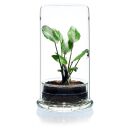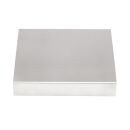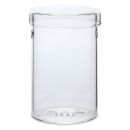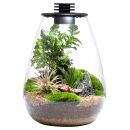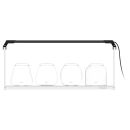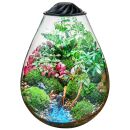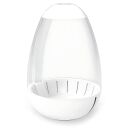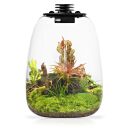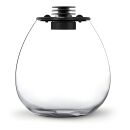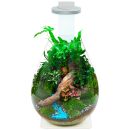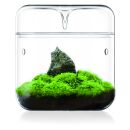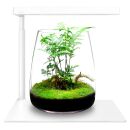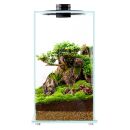Planters and Wabi Kusa
Wabi-Kusa, a fascinating form of terrascaping or designing with planters, combines the beauty of the aquatic plant world with a touch of Zen aesthetics. This Japanese style, which focuses on natural simplicity and the beauty of imperfection, has gained popularity worldwide in recent years. Wabi-Kusa is not just a form of plant care; it is an art form that brings tranquility and a connection to nature into your home. The term 'Wabi' stands for the beauty of simplicity, while 'Kusa' means plant. Together, they form a harmonious connection that presents the beauty of nature in a simplified form.
Wabi-Kusa is often seen as a combination of aquascaping and terrascaping, as it contains both aquatic and terrestrial elements. The core of Wabi-Kusa is a ball of substrate, wrapped with moss and planted with a variety of aquatic plants. These plant balls can be kept fully submerged or partially emersed (above water), creating a unique and dynamic plant landscape. The selection of plants is crucial for the success of a Wabi-Kusa, with small, sturdy plants like Anubias, Cryptocoryne, or various types of moss being particularly suitable. However, stem plants or other aquarium plants can also be used, which can produce beautiful flowers depending on the growth conditions.
The care of a Wabi-Kusa is relatively simple but requires regular attention. It is important to find the right balance of moisture, light, and nutrients. Wabi-Kusa needs high humidity, which is achieved by regularly spraying the plants. Additionally, sufficient lighting is required to promote plant growth. Since Wabi-Kusa is often kept in open containers, it is important to keep an eye on the water level and refill regularly.
Wabi-Kusa is more than just a component of a planter; it is also a stylish element of modern interior design. With its simplicity and naturalness, a Wabi-Kusa fits perfectly into minimalist and modern living spaces. It is an excellent way to bring a touch of green and nature into urban environments. A well-designed Wabi-Kusa acts like a living piece of art and can serve as a central focal point in any room.
The concept of Wabi-Kusa extends beyond mere plant care and touches on the philosophy of Wabi-Sabi aesthetics - the acceptance of transience and imperfection. To care for a Wabi-Kusa means to appreciate the natural changes and growth of the plants and to experience a connection to nature on a deeper level. It reminds us to find beauty in simplicity and to respect nature in all its forms.




